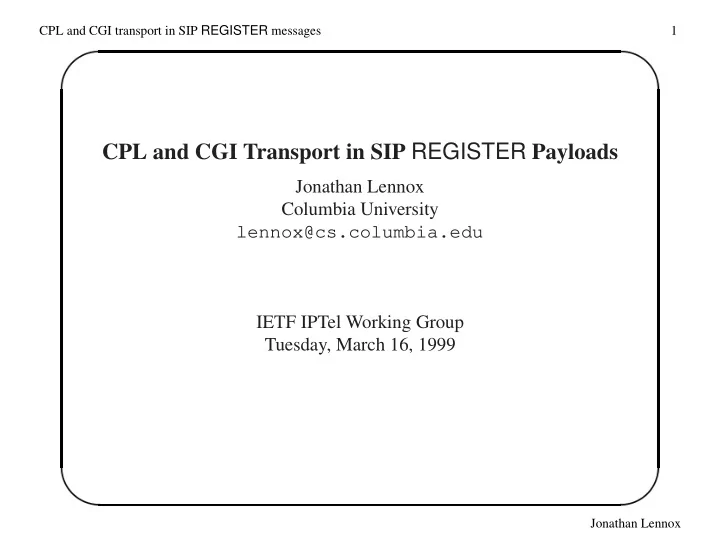

' $ CPL and CGI transport in SIP REGISTER messages 1 CPL and CGI Transport in SIP REGISTER Payloads Jonathan Lennox Columbia University lennox@cs.columbia.edu IETF IPTel Working Group Tuesday, March 16, 1999 & % Jonathan Lennox
' $ CPL and CGI transport in SIP REGISTER messages 2 Example REGISTER sip:@sip.example.com SIP/2.0 From: Joe User <sip:joe@example.com> To: "J. User" <sip:joe@example.com> CSeq: 18 REGISTER Call-ID: 39485832@joespc.example.com Accept: application/cpl, application/sdp, text/html Authorization: Basic am9lOnBhc3N3b3JkAFBX Content-Type: application/cpl Content-Length: 150 <?xml version="1.0" ?> <!DOCTYPE call SYSTEM "cpl.dtd"> <call> <location url="sip:smith@phone.example.com"> <redirect /> </location> </call> & % Jonathan Lennox
' $ CPL and CGI transport in SIP REGISTER messages 3 Important features • Scripts are uploaded in bodies of SIP REGISTER messages. • Servers return the currently registered script in responses to successful registrations (if the request’s Accept headers specify the script’s content type). • Scripts are deleted by uploading the script content type with an empty body: Content-Type: application/cpl Content-Length: 0 • A user has only one script at a time (of a given content type). • Uploads MUST have authorization information. & % Jonathan Lennox
' $ CPL and CGI transport in SIP REGISTER messages 4 Persistence Model • SIP registrations are normally transient — they persist for a fixed length of time (30 minutes). • Script uploads are persistent — they last until explicitly changed or removed, and are stored in non-volatile storage. • Clients SHOULD only transmit scripts when explicitly requested to. • This prevents “script flapping,” where several clients are periodically uploading different scripts. & % Jonathan Lennox
' $ CPL and CGI transport in SIP REGISTER messages 5 Open Issues • How do we support multiple scripts per user? (e.g. for both incoming calls and outgoing calls). – Category tags on the Content-Type? Content-Type: application/cpl; category=outgoing Enumerating all possible categories gets very complicated. – Leaving it up to the script? – How do we return multiple scripts? multipart/sip-id ? • Should this technique use a Require header? – A server which doesn’t understand it should ignore the registration bodies. – What if someone wants to use registration bodies for some other purpose? & % Jonathan Lennox
' $ CPL and CGI transport in SIP REGISTER messages 6 Open Issues (cont) • Is the zero-length body for deletion appropriate? – What happens if an empty body is legal for a content type? • Does the persistence model work? – It should, but no practical experience with it yet. – Is the interaction with REGISTER persistence confusing? • Should this be an IPTel work item? – CPL transport is necessary for the CPL work. – Is something SIP-specific appropriate for this group? – Should this be part of a larger document, “Transporting CPL Scripts,” which covers a large number of techniques? & % Jonathan Lennox
Recommend
More recommend